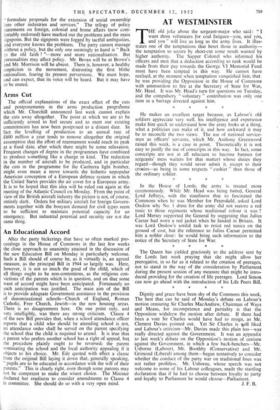AT WESTMINSTER
item in a barrage directed against him. –
* *
He makes an excellent target because, as Labour's old soldiers appreciate very well, his intelligence and experience make him quick to understand how the army looks at a thing, what a politician can make of it, and how awkward it may be to reconcile the two views. The use of national service- men as officers' servants, which Mr. Anthony Greenwood raised this week, is a case in point. Theoretically it is not easy to justify the use of conscripts in this way. In fact, some conscripts are not at all reluctant to become batmen (or sergeants' mess waiters for that matter) whose duties they regard—though they would never admit it, except to their cronies—as being in some respects " cushier " than those of the ordinary soldier.
In the House of Lords, the army is treated more ceremoniously. While Mr. Head was being baited, General Lord Jeffreys, with the stateliness that so fascinated the Commons when he was Member for Petersfield, asked Lord Onslow why No. 1 dress for the army did not restore a red tunic to those regiments whose traditional' colour it was ? Lord Mersey supported the General by suggesting that Julius Caesar had worn a red jacket when he landed in Britain. It was Lord Onslow's sordid task to resist red tunics on the ground of cost, but the reference to Julius Caesar permitted him a nobler close: he would bring such information to the notice of the Secretary of State for War.
* * * *
The Queen has yielded graciously to the address sent by the Lords last week praying that she might allow her prerogative, in so far as it related to the creation of peerages, not to stand in the way of the consideration by Parliament during the present session of any measure that might be intro- duced providing for the creation of life peerages. Lord Simon can now go ahead with the introduction of his Life Peers Bill.
* * * *
Dignity and grace have been shy of the Commons this week. The best that can be said of Monday's debate on Labour's motion censuring Sir Charles MacAndrew, Chairman of Ways and Means, for incompetence and partiality is that the Opposition withdrew the motion after debate. If there had been a vote Sir Charles would have had to resign, as Mr. Clement Davies pointed out. Yet Sir Charles is bell liked and Labour's criticism—Mr. Davies made this plain too—was really directed against the Government. It was an appendix to last week's debate on the Opposition's motion of cenSure against the Government, in which a few back-benchers—Mr. Usborne (Labour), Mr. Boothby (Conservative) and Mr. Grimond (Liberal) among them—began tentatively to consider whether the conduct of the party war on traditional lines was not rather profitless. Mr. Usborne, whose speech was not welcome to some of his Labour colleagues, made the startling declaration that if he had to choose between loyalty to party and loyalty to Parliament he would choose—Parliament.
J. F. B.


































 Previous page
Previous page